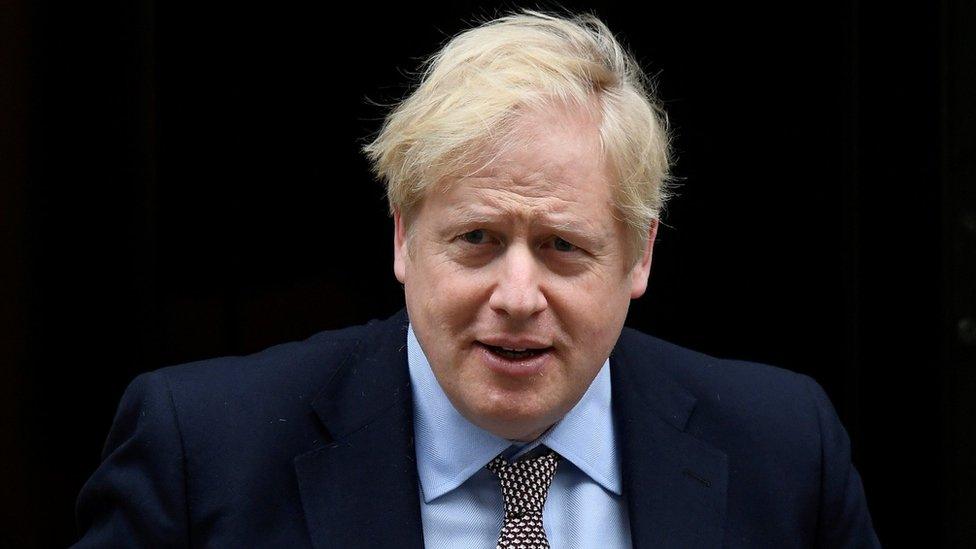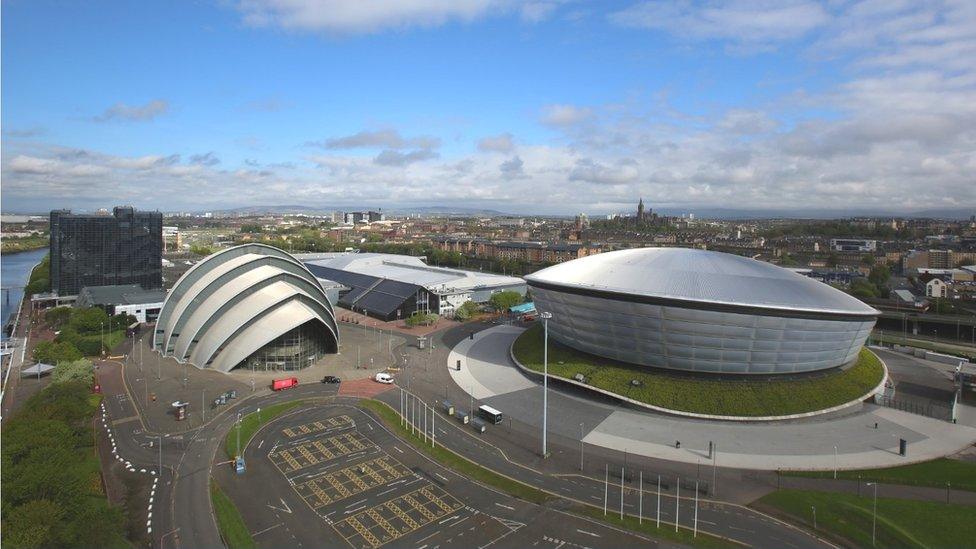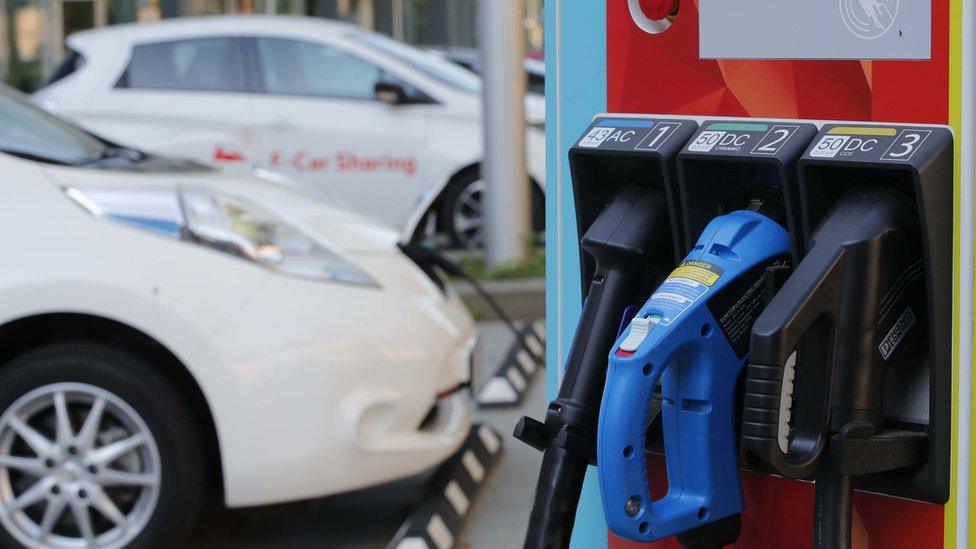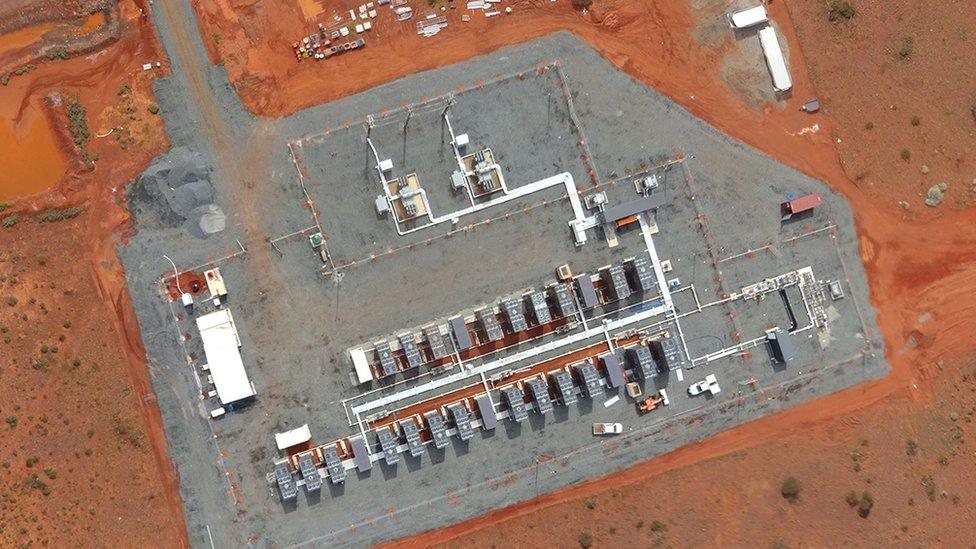PM takes the low emissions road
- Published

A 10-point green agenda from Boris Johnson is highly political, and raises big questions about how or if it can be delivered in Scotland.
The shift to cars and eventually trucks being low/no emission leaves a sizeable gap in Treasury revenue, and raises once more the option of road user charging.
It is part of a wider economic and business shift to figuring out what needs to be done to reach climate change targets, with significant plans this week from Aggreko, one of Scotland's big and polluting energy companies.
It's time for Boris Johnson to save the planet, and his premiership. The prime minister has opted for a re-set; post-Brexit, eventually post-Covid, post-Dominic Cummings.
COP 26, the mega-conference in Glasgow, beckons next November. He will have a more agreeable and amenable US president, or vice president Kamala Harris, to welcome to the Scottish Events Campus on Clydeside.
So this week, we get a grand vision, or at least a 10-point plan, to paint the UK economy a lively shade of green.
Sales of petrol and diesel cars will be phased out by 2030, with only the cleanest of hybrids allowed for the years thereafter.
That's quite a target - to re-tool the car industry, and install sufficient charging points, with big shifts required in rewiring power distribution to let that happen.
It's also a consideration for your next car purchase. There will be more rapid obsolescence for fossil-fuel vehicles, and therefore declining re-sale prices.
And there's the start of a conversation about road freight going diesel-free. No deadline yet, but like buses, other targets will be along sooner than you would think.

The Scottish Events Campus in Glasgow will host the COP26 UN summit between 1 and 12 November next year
Power companies will be delighted, as they are every time a politician sets out a vision and a target: once that's set, they present the government with the bill, which is duly passed on to the public, as customer.
The 10 points include hydrogen power and other innovations, low-emissions marine and aviation travel, plus adaptations to make public buildings more efficient.
How much applies in Scotland is complicated. Scotland has had a more ambitious target for phasing out diesel and petrol by 2032, but that's now being leapfrogged. Will 2030 now be matched? Probably.
What of the tax implications? Holyrood controls Scottish roads, but not road traffic law, or fuel tax or vehicle excise duty - the latter charged at no or low rates for low-emission vehicles.
Removing those taxes from the Treasury's weaponry, Rishi Sunak and his successors are going to have to find a replacement for the revenue lost.
Already this week, we've seen the idea floated of road user charges, based on mileage and time of use. It's not in the prime minister's 10 points this week, but it's probably in the top 20.
Road user charging has green credentials and the technology is not far off. But that flag has been run up the pole before, and quickly shot down. It's politically difficult, and all the moreso if it's seen as a revenue grab.

Many of Boris Johnson's targets for car charging points, coastal defences and forestry seem to apply only to England. But to hit his targets for wind and marine power, he will have to reach into other parts of the UK.
Might this require Whitehall and St Andrew's House to co-ordinate the introduction of such charges in the next few years? And how could that be done?
Or could this bit of part-devolved territory be the battleground on which the UK government parks its environmental tanks, to push devolution back?
That would be in keeping with city growth funds, and it may also be the way in which Whitehall distributes the post-Brexit replacement for European structural funds.
Either way, is there a plan? It's just possible, given what else he's been saying about Scotland and devolution, that the prime minister has not thought through the devolved implications.
While government gears up for a decade and more of greening the economy, business sectors are preparing their plans. The salmon farming industry did so recently.
And on Tuesday, one of Scotland's biggest corporates set out its own ambitions, which could have implications around the globe.
Aggreko is based in Glasgow with an assembly plant near Dumbarton, West Dunbartonshire. It provides temporary power - famously to the Olympics and World Cup, and also to music festivals, to hurricane-hit bits of the Caribbean, to mines far from the power grid in the Australian outback, and to entire nations where the power sector has failed to keep pace with economic development.
It's a grubby business, with around 70% of its fleet of generators running off diesel. There's already a shift under way to gas. In Nigeria and other countries, it is more economic to truck gas as much as 1000 kilometres in a "virtual pipeline" to the generator than to run off diesel.
That is destined to grow fast. And with investment announced this week of between £250m and £350m, Aggreko is shifting at a much faster pace to reach 30-40% diesel by 2030, and net zero 20 years after that.

An aerial view of an Aggreko battery park
In addition to gas, there's to be a big push into biofuels and recycled cooking oil. Solar and photovoltaic has been getting much cheaper and expanding rapidly in developing nations. Aggreko's chief executive Chris Weston sees that as more of an opportunity than a threat to his business model.
It is intermittent, and requires a big power company to provide both the baseload and the batteries to even out supply. Batteries large and small are going to be a much bigger part of the Aggreko business model - up by around 30-fold to 1.5 gigawatts of capacity.
Further down the road, when the technology is commercially viable, Aggreko wants to adapt much of its generator fleet to hydrogen.
All this activity ought to be good news for Aggreko workers at its Lomondgate plant near Dumbarton. A lot of those generators will have to be adapted for new fuel sources. More jobs are likely, but not being promised yet.
Meanwhile, after a huge fall in demand for its power at events around the world, there are stirrings of recovery.
In Japan, staffing is on the up in a warehouse full of Aggreko generators which were parked there last summer, with the postponement of the Olympics.
For future Commonwealth Games and World Cups, the tendering process is back again. Mr Weston says the order book is looking more lively in the second quarter of next year. With everyone hoping a vaccine can open up gatherings for social, cultural and sporting events, it looks livelier still by the second half of next year - probably including some temporary power support for the vast environment conference close to company headquarters.
- Published28 May 2020

- Published3 March 2020

